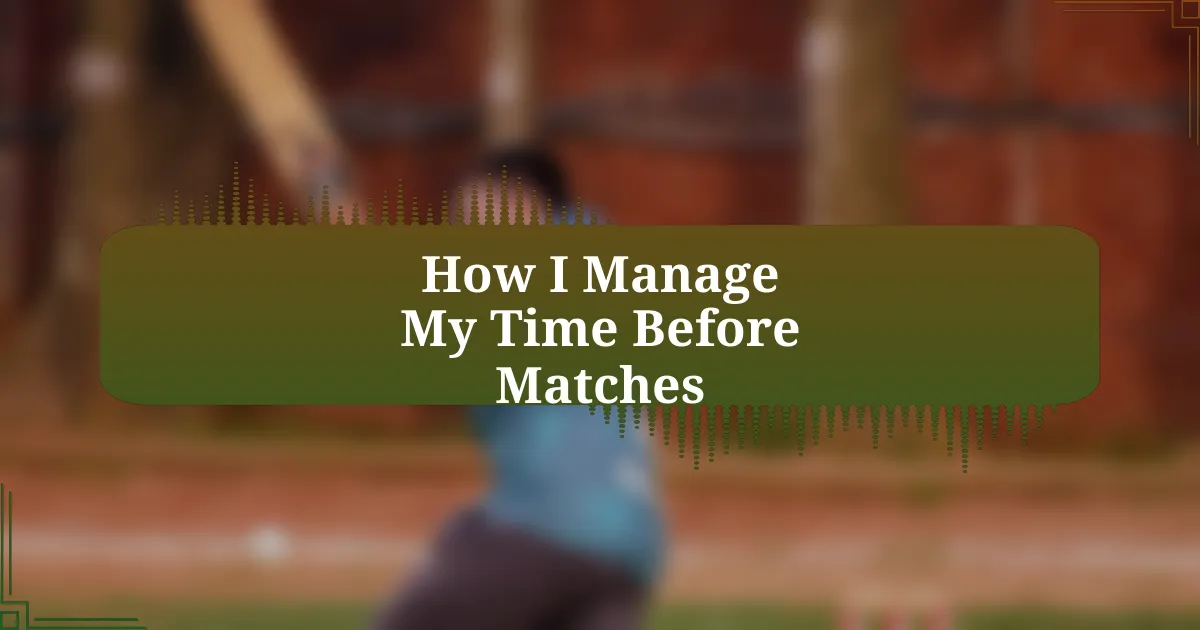Key takeaways:
- Effective time management is crucial for balancing cricket practice with work and personal commitments; prioritization and organization enhance performance.
- Daily routines, such as mental visualization and proper nutrition, significantly impact match readiness and overall focus.
- Tools like digital calendars and to-do lists help maintain schedules and track tasks to enhance preparation and ensure discipline.
- Flexibility in adjusting schedules and incorporating breaks is vital for optimal performance and mental clarity before matches.
Author: Evelyn Harper
Bio: Evelyn Harper is an award-winning author known for her evocative storytelling and rich character development. With a background in psychology, she weaves intricate narratives that explore the complexities of human relationships. Her debut novel, “Whispers in the Wind,” received critical acclaim and established her as a fresh voice in contemporary fiction. A graduate of the Iowa Writers’ Workshop, Evelyn resides in Portland, Oregon, where she continues to write and inspire aspiring authors through workshops and mentorship. When not immersed in her writing, she enjoys hiking the Pacific Northwest trails and sipping coffee at local cafes.
Understanding time management skills
Time management skills are vital for any amateur cricket player, especially when balancing practice, work, and personal commitments. I remember a time when I juggled work deadlines and weekend matches. It was stressful, and I realized that without planning my days meticulously, I was missing out on both my productivity and my passion for cricket.
I often find myself asking, “How can I make the most of my limited time?” The answer lies in prioritization. For every match, I create a checklist that outlines what needs to be done—like packing my gear, reviewing my strategies, and even squeezing in a quick workout. This not only keeps me organized but also allows me to mentally prepare, ensuring that I step onto the field feeling confident.
Interestingly, I’ve discovered that blocking out dedicated time slots for specific tasks significantly reduces my anxiety. For instance, I set aside evenings for relaxing and visualizing my gameplay while skipping distractions like social media. This shift in focus transforms my approach, improving both my mental state and performance. By understanding and honing my time management skills, I can fully immerse myself in cricket, feeling both fulfilled and ready to give my best during matches.
Daily routines before cricket matches
It’s fascinating how small daily routines can make a significant difference before a match. I usually start my match day early, waking up before dawn to enjoy some quiet moments with my thoughts. That stillness allows me to mentally strategize and visualize my gameplay, a practice that truly enhances my focus as the day unfolds.
In the hours leading up to a match, I pay close attention to my nutrition. On one memorable occasion, I experimented with a pre-match smoothie packed with bananas and spinach, which had me feeling energized throughout the game. Have you ever considered how what you eat influences your performance? I’ve learned that a balanced meal not only fuels my body but also calms my mind, setting a positive tone for the day.
Before I leave for the match, I have a ritual of going over my gear one last time. This simple act is more than just checking off items; it instills a sense of readiness. Sometimes, I find myself whispering motivational quotes that resonate with me as I put on my pads. It’s all about creating an atmosphere of confidence, and somehow, that little routine makes me feel invincible before I step onto the pitch.
Setting priorities for match preparation
Setting priorities for match preparation can make or break your performance. I’ve found that the first step is identifying what’s most crucial for me on match day. For instance, I always prioritize my warm-up routine because I’ve learned the hard way that neglecting it can lead to stiffness and affect my play. Do you have a specific drill or exercise that you swear by?
Equally important is reviewing the strategies I plan to implement during the game. A few hours before a match, I sit down and go over my notes, thinking about how I can adapt to different situations. One time, after analyzing the opposition’s previous matches, I adjusted my batting technique, which ultimately helped me score a vital fifty. It’s moments like these that reinforce the value of prioritizing time for mental prep, don’t you think?
Lastly, balancing downtime is just as crucial. I make it a point to rest and avoid any last-minute distractions. A couple of hours before I leave, I often indulge in light reading or listen to music that pumps me up. This balance of preparation and relaxation keeps my energy levels optimal and my mind clear. How do you find that sweet spot between getting ready and staying relaxed?
Tools for effective time management
Having the right tools for effective time management is essential for any amateur cricketer. I’ve found that using a digital calendar really helps keep track of training sessions, matches, and even personal commitments. It’s amazing how much clearer my schedule looks when I block out time just for cricket. Don’t you think visualization can make a significant difference in staying on track?
Another tool I swear by is a simple to-do list. Each week, I jot down tasks that need to be accomplished before my matches, from fitness drills to reviewing game footage. There’s something immensely satisfying about crossing items off that list, and it also helps me focus on what truly matters. Have you noticed how checking off tasks brings a sense of achievement?
Finally, I’ve started integrating time management apps into my routine. For example, I use one to set reminders for my warm-ups and mental prep, ensuring that I stay disciplined while also being flexible. It might sound a bit excessive, but these gentle nudges keep me on my toes and remind me that every minute counts. Can you relate to using technology to enhance your preparation?
My personal time management strategies
I prioritize my evenings before matches for mental and physical preparation. I often set aside focused time for visualization techniques, where I picture myself executing successful plays on the field. I find that this mentally prepares me for challenges, making it easier to handle pressure. Have you ever experienced how visualization changes your mindset?
A crucial aspect of my strategy is establishing boundaries. I carve out specific hours dedicated to cricket, ensuring that other commitments don’t encroach on my practice time. For example, when I was juggling a busy work schedule, I clearly communicated to my colleagues that those few evenings each week were reserved solely for cricket. This not only honors my commitment to the sport but also enables me to be fully present during my training.
Lastly, I always advocate for breaks between activities. After a long practice or a busy day, I take time to relax and recharge, whether it’s reading a book or going for a light jog. These moments of downtime help me maintain my energy levels and keep me motivated. How about you? Have you tried incorporating breaks into your routine?
Adjusting schedules for optimal performance
To optimize my performance before matches, I often find myself reshaping my daily schedule to prioritize what truly matters. For instance, I’ve learned that if I have a match in the morning, I’ll adjust my evening plans, sometimes even swapping dinner with a more substantial lunch to ensure I’m fueled appropriately. Have you ever thought about how meal timing can influence your energy levels?
Additionally, I’ve discovered that flexibility plays a vital role in performance. If practicing at my usual time isn’t feasible due to unexpected work commitments, I’ll shift my practice to early mornings. It’s fascinating how this small adjustment can keep my routine intact while providing the fresh perspective I need for focus. When was the last time you experimented with the timing of your training sessions?
Beyond just the physical aspects, I actively create mental space in my schedule. Before crucial matches, I intentionally carve out moments for solitude, sometimes even a quiet cup of tea on my porch. This time helps me clear my mind and center my thoughts, ultimately reducing pre-match anxiety. Have you experienced how a few minutes of peace can transform your mindset before a big event?



